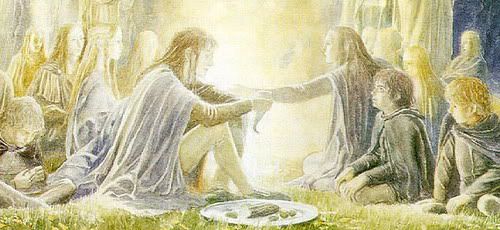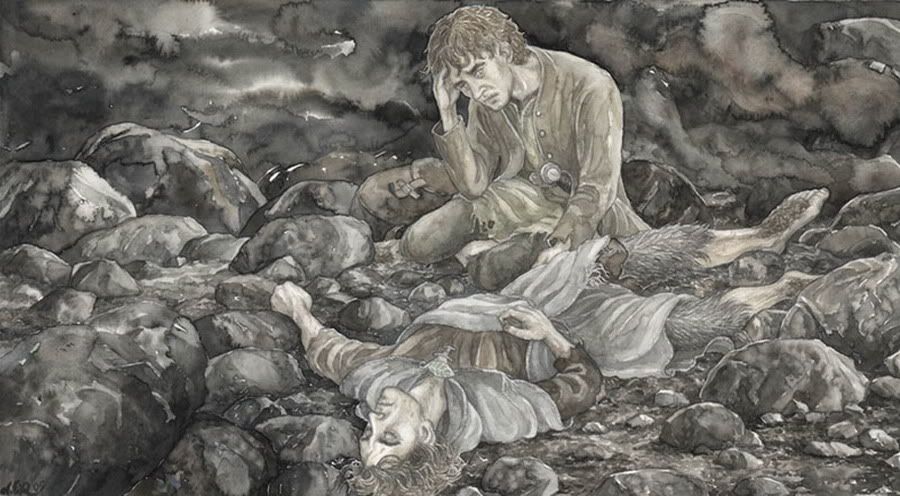Announcement to M00bies reads the B00ks fans: Teremia posted!

~ Frodo's meeting with Gildor, by Alan Lee
When I first got immersed in online LotR fandom, it was at TORc, TolkienOnline. I "met" nice people, and read and wrote and learned mass quantities there (like the Coneheads drinking beer). But of all the great threads I followed during my time there, the one that made the greatest impact on me was M00bies reads the B00ks, a read-along thread started in the LotR Film Forum. It was opened by Teremia, a wonderful Tolkien thinker and writer, who initiated and continued the tradition of introducing every chapter with a beautifully-written and observed post.
I didn't find this thread until the Fellowship had got to LothLorien, but, so impressed was I, I went back and read it from the beginning.
There are some dull spots here and there, when we commenters haven't matched the excellence of the chapter intros, but, on the whole, this thread was the best I ever came across. It taught me TONS about Tolkien, LotR, its characters and themes, the discipline of writing, aesthetics, and you name it. Besides which, the level of hospitality and courtesy was phenomenal.
Nothing (apart from the films that rejuvenated my zeal for the book and its author) -- not any published book or any fanfic -- has more greatly enhanced my appreciation of Tolkien's work.
So.
The news is that after a hiatus of over a year, Teremia has posted a new chapter introduction. She last posted [brilliantly] a chapter intro for "The Tower of Cirith Ungol", on April 25 last year. Today, May 6, she has posted an introduction for the next chapter, "The Land of the Shadow."
Here is a link to the page with her latest post, dated 06 May, M00bies Reads the Books, p. 27. Scroll down the page to Teremia's post.
If you enjoy that and want to read other great intros, here's a link to the first page of M00bies reads the B00ks. Teremia's first intro. is for the "Prologue", on Jan. 17, 2003. Her intros become longer and more detailed as the thread progresses. The thread is very neatly organized and easy to browse, with an intro. for every chapter, in book sequence.
Or, to give you an idea of the quality of the posting on this thread (and the responses to the intros are often excellent, too), here is a copy-and-paste of Teremia's latest installment, on "The Land of the Shadow" from RotK....

~ 'The Land of the Shadows', by Anke Eissman
”The Land of Shadow”
Throughout this chapter, a question of scale and point-of-view: we go from the grand scale of the hobbits’ triumph over the Watchers at the end of the previous chapter (chanting in Elvish! Walls crumbling as they pass by!), to the small, human, hobbity scale of small people running from evil into a barren and inhospitable place. At the end of the first little section, Sam says they can’t get off the road they’re on, “not without wings.” That is the scale we now operate in for a while, the scale of mortal creatures, “without wings”; it’s also an echo of the last thing we saw in the previous chapter: “Out of the black sky there came dropping like a bolt a winged shape, rending the clouds with a ghastly shriek.”
So we see how humble the hobbits are, in comparison with the grand winged foe! But like the surprising trickle of water coming down the rocky ledges of Mordor, there are whispers and rumors throughout this chapter suggesting that this vision of “scale” is not the final one, that in the final analysis it will not all be about who has wings and who doesn’t.
After the Elvish of the previous chapter, the very language of Sam and Frodo seems homely and hobbit-like (see Sam on the topic of thorns: “Bless me, Mr. Frodo, but I didn’t know as anything grew in Mordor! But if I had a’known, this is just what I’d have looked for. These thorns must be a foot long by the feel of them…”). But these small-scale concerns (thorns, thirst, fatigue) become signs that the hobbits haven’t given up yet, that little things can still matter: the very basic component of hope, even in this rather hopeless place. Sam falls asleep because he’s tired, which Frodo notices with “amazement”; but the word might as well have been “wonder.” It is a miracle on the small scale that Sam keeps marking the basic rhythms of life. Again, the miraculous nature of these things is something Sam himself remarks on: “If only the Lady could see us or hear us, I’d say to her: ‘Your Ladyship, all we want is light and water: just clean water and plain daylight, better than any jewels, begging your pardon.’” And when light (even a slightly bleary sort of light) and water (even a rather oily sort of water) appear, the hobbits are truly thankful (as I’m sure we should all be more often! Smile)
The question of scale stretches with the coming of the light: “dim light leaked into Mordor like pale morning through the grimed window of a prison.” Not just light but messages pass through prison windows sometimes, and Sam reads the light as a message: “’Look at it, Mr. Frodo!’ said Sam. ‘Look at it! The wind’s changed. Something’s happening. He’s not having it all his own way. His darkness is breaking up out in the world there. I wish I could see what is going on!’” Here the narrator chimes in to remind us of what is happening in the outside world: “It was the morning of the fifteenth of March, and over the vale of Anduin the Sun was rising above the eastern shadow, and the southwest wind was blowing. Théoden lay dying on the Pelennor Fields.”
Now these lines work as a kind of shock on the reader, a taking-in of breath: Théoden! Éowyn! Merry! It comes back to us. And reading it this time, I had to stop and wonder what it would be like if the only messages we could have about the well-being of our most beloved friends could only be had, as Sam takes the message here, by looking up and trying to gauge the general course of the world. It’s like looking for a memory of the butterfly’s wings in the storm that arises out of them far later and far away!
When they find water, and walk on, and then finally sleep, Tolkien gives us one of the images that stays with a person long and deep, that brings us back to the book again, eventually, no matter how far away we may have wandered.
“Far above the Ephel Dúath in the West the night-sky was still dim and pale. There, peeping among the cloud-wrack above a dark tor high up in the mountains, Sam saw a white star twinkle for a while. The beauty of it smote his heart, as he looked up out of the forsaken land, and hope returned to him. For like a shaft, clear and cold, the thought pierced him that in the end the Shadow was only a small and passing thing: there was light and high beauty for ever beyond its reach. His song in the Tower had been defiance rather than hope; for then he was thinking of himself. Now, for a moment, his own fate, and even his master’s, ceased to trouble him…..”
Here is a moment when Sam - representative of the smallest of scales, the mercies of the everyday - gets a glimpse not just of how things are going “out in the world there” (as when the light suggests to him the course of the battle), but the higher perspective of the stars, beyond this world. The name of the chapter is “The Land of Shadow,” but of course shadow suggests the presence of light somewhere, light that is being temporarily blocked.
“They woke together, hand in hand.” That is the human equivalent of the sweetness of starlight.
When Sam and Frodo look out over the valley, at the vast military camps there, the narrator pauses to hint to us that the world is larger than we have yet suspected: “Neither he nor Frodo [nor the reader!] knew anything of the great slave-worked fields away south in this wide realm, beyond the fumes of the Mountain by the dark sad waters of Lake Núrnen….” (I almost typed “Lake Lachrymose” there, so sure am I that Lemony Snicket’s Lord of the Rings would take place all entirely There and skip over Rohan, Lothlorien, and Gondor.) I’m sure I’m not the only one who used to study the map of Middle-Earth and wish to know more about all the obscurest places!
Frodo and Sam overhear one of those informative orc conversations that ends with the orcs (who are supposed to be tracking our heroes) coming to blows. I’ve always liked listening to those orcs. Their lives are clearly not pleasant ones. We never see what an orc would look like, “redeemed,” but they are so human in their bickering that some tiny part of me begins to wonder about their stories. I also (however) like Sam’s comment once one of them has put an arrow in the eye of the other and run off: “If this nice friendliness would spread about in Mordor, half our trouble would be over.”
They plod and plod for the rest of the chapter, and another shadow - Gollum - scurries around them, too. The plodding is very dear to my heart, and in the movies I missed the sense of vast and grueling effort, grueling, thirsty effort, this part of the book so well describes. The nightmare of being caught by the marching orcs and being made to march with them, mile after mile; all through those pages our worry is that of Sam: what happens if Frodo collapses? He can’t handle this, can he? And then Sam sees the moment to roll with Frodo off the road and away again. Frodo crawls his twenty yards, and “then he pitched down into a shallow pit that opened unexpectedly before them, and there he lay like a dead thing.”
They have been making do on very little. But there has BEEN that “little,” those trickles of potable water, those small moments of luck and good fortune, those thin brown bushes to hide behind so that the arguing orcs don’t spy you. The land of shadow is a good place to count your blessings, and to be reminded of what really counts as a blessing. As Sam says when he spies the “little falling streamlet”: “If ever I see the Lady again, I will tell her! Light and now water!” It is a something of a cosmic antidote for Shelob’s pestilent femininity to have these moments of grace marked as the Lady’s (the star, too, reminds us of her). Light and now water! A good toast, and I lift my glass with it to all of you who made this thread such a wonderful thing, all those many ages ago!
As I told Teremia in the thread, I could spread this on bread or lap it out of my hands. I've been hungering and thirsting for this sort of thing.
~ Mechtild